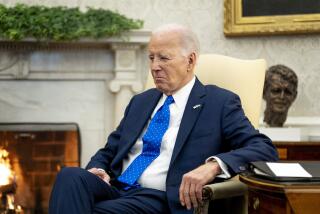When Words Fail: The Stilted Language of Tragedy
- Share via
SAN FRANCISCO — Twice during the last few days I listened on TV as witnesses to the World Trade Center calamity broke down, unable to continue their accounts. On both occasions the interviewers waited for a moment of awkward silence, then finished the sentences.
We feel conflicting urges at a moment like this. On the one hand, we hold that there are times when words ought to fail us, that there are things so horrible that silence is the only language for them. “Indescribable,” “unutterable,” “unspeakable”--those were the words that kept coming to mind as we struggled to comprehend what had happened.
But we share those reporters’ discomfort with dead air, too. It may be that language can’t do justice to the horror of experience, but it’s the only game in town. So we all sat rapt as the networks kept running the same awful video clips under a babble of wan descriptions--”shocking,” “horrific,” “terrible,” “like a battlefield.” As if the repetition would eventually render the reality as familiar and banal as the language itself.
Language seemed to fail us, too, as a vehicle for expressing our sense of outrage. The popular press had it relatively easy--the San Francisco Examiner’s front page the day after the attack showed a color picture of the World Trade Center explosion under the one-word screamer “Bastards!”, which, after all, is something we all needed to get off out chests.
But that approach wasn’t an option for those to whom the public was looking for a more considered judgment. The official condemnations sounded oddly stilted. Both Gov. Gray Davis and New York Sen. Charles Schumer called the attacks “dastardly,” a word that tends to bring to mind a mustachioed Gilbert and Sullivan villain, not a crazed zealot. It occurred to me that they might have seized on the word because of its sound associations, but in that case I preferred the Examiner’s version.
But other officials took the same anachronistic tone. President Bush called the attacks “despicable,” which has a primly Victorian sound to it. A TV commentator described the acts as “nefarious,” another Gilbert and Sullivan word. And numerous people used the word infamy, which already sounded old-fashioned when President Franklin D. Roosevelt used it in describing the Pearl Harbor attack back in 1941.
You could hear that Victorian note, as well, in the condemnations of the hijackers as “craven” and as “faceless cowards,” as if the most damning thing you could say about them is that they behaved dishonorably. Surprise attacks on unarmed civilians are repugnant by any moral standard. But “cowardly” doesn’t explain that suicidal fanaticism--indeed we might wish that some of the hijackers had chosen to chicken out when the time came to throw their lives away.
It was all strikingly different from the language we use to condemn other sorts of murderous outrages. The unabomber was demented and the Columbine killings were “senseless”; nobody would have thought of describing either as “infamous” or “dastardly.”
True, everyday words might seem insufficient to describe an experience of this magnitude, at least for people and publications who are speaking for the historical record. Even “tragedy” felt too slight, vitiated by years of tabloid overexposure. But the contemporary language hasn’t wholly lost its moral bearings. We still have resources that are up to rendering the enormity of the attacks, as well as words can ever hope to do: “ghastly,” “monstrous,” or “enormity” itself.
In the wake of the attacks, though, official America needed something else: language that would reassert control of a world that had gotten terrifyingly out of hand. A high Victorian indignation serves that purpose well. It evokes the moral certainties of a simpler age, when the line between civilization and barbarism was clearly drawn, and powerful nations brooked neither insult nor injury from lesser breeds without the law. This may be the first war of the 21st century, as President Bush has said. But its rhetoric will be taken from the 19th.
More to Read
The biggest entertainment stories
Get our big stories about Hollywood, film, television, music, arts, culture and more right in your inbox as soon as they publish.
You may occasionally receive promotional content from the Los Angeles Times.










